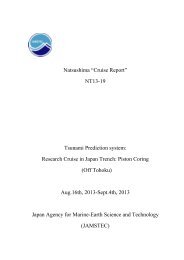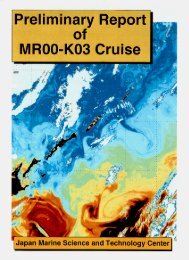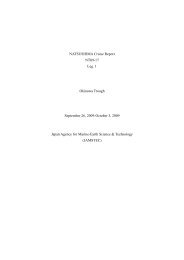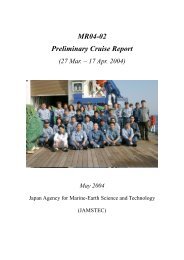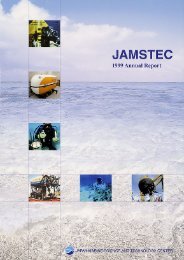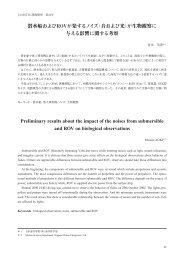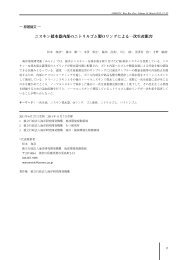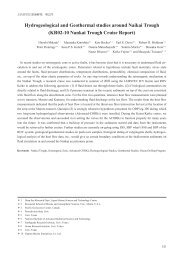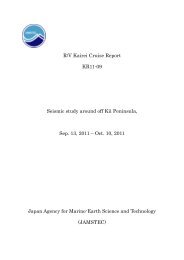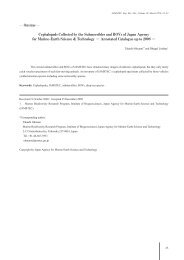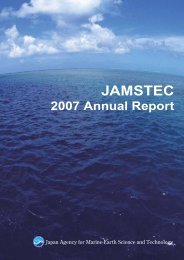Marine Ecosystems Research Department - jamstec japan agency ...
Marine Ecosystems Research Department - jamstec japan agency ...
Marine Ecosystems Research Department - jamstec japan agency ...
You also want an ePaper? Increase the reach of your titles
YUMPU automatically turns print PDFs into web optimized ePapers that Google loves.
Japan <strong>Marine</strong> Science and Technology Center<br />
Frontier <strong>Research</strong> System for Global Change<br />
Dec-Jan<br />
Feb-Mar<br />
60N<br />
50N<br />
(a)<br />
Qe<br />
60N<br />
50N<br />
(b)<br />
Qe<br />
40N<br />
40N<br />
30N<br />
30N<br />
20N<br />
120E 150E 180 150W 120W<br />
20N<br />
120E 150E 180 150W 120W<br />
60N<br />
50N<br />
(c)<br />
w(qs')<br />
60N<br />
50N<br />
(d)<br />
w(qs')<br />
40N<br />
40N<br />
30N<br />
30N<br />
20N<br />
120E 150E 180 150W 120W<br />
20N<br />
120E 150E 180 150W 120W<br />
60N<br />
50N<br />
(e)<br />
-w (qa')<br />
60N<br />
50N<br />
(f)<br />
-w (qa')<br />
40N<br />
40N<br />
30N<br />
30N<br />
20N<br />
120E 150E 180 150W 120W<br />
20N<br />
120E 150E 180 150W 120W<br />
60N<br />
50N<br />
(g)<br />
w'(dq)<br />
60N<br />
50N<br />
(h)<br />
w'(dq)<br />
40N<br />
40N<br />
30N<br />
30N<br />
20N<br />
120E 150E 180 150W 120W<br />
20N<br />
120E 150E 180 150W 120W<br />
-40 -30 -20 -10 0 10 20 30 40<br />
Fig. 3 (a-b) Difference maps of bi-monthly anomalies in upward latent heat flux (W/m 2 ) between the<br />
opposing phases of the dominant mode of the North Pacific decadal variability for (a) November-<br />
December and (b) January-February. (c-d); As in (a-b), respectively, but for a contribution from<br />
SST anomalies. (e-f); As in (a-b), respectively, but for a contribution from air temperature anomalies.<br />
(g-h); As in (a-b), respectively, but for a contribution from wind speed anomalies.<br />
2. Hydrological Cycle <strong>Research</strong> Program<br />
Asian countries depend, to a great extent, on summer<br />
and winter monsoon precipitation for their water<br />
resources. The regional as well as continental-scale<br />
hydrological cycles, at the same time, affect variabilities<br />
of monsoon climate through various feedbacks. To<br />
understand the physical processes involved in the hydrological<br />
cycles is, therefore, very crucial for predicting<br />
the hydro-climate condition with various time-scales.<br />
This program will focus on understanding the hydrological<br />
processes in the weather and climate systems,<br />
and develop models for predicting regional and continental-scale<br />
hydrological cycles. Particular emphasis<br />
will be put on the processes in the Asia/Australia monsoon<br />
region and the Eurasian continent.<br />
a. Group for Large-scale Hydrological Processes<br />
This group focuses on the impact of climate change<br />
and variability on continental and regional scale<br />
hydrological cycle and their feedbacks to climate variability,<br />
based on global scale reanalysis data, satelliteremote<br />
sensing data and in-situ measurement data.<br />
Validation of hydrological processes obtained from<br />
simulations by General Circulation Models (GCM)<br />
and regional climate models is also carried out by<br />
using observational data mentioned above. In the<br />
FY, the following studies were conducted.<br />
a-. Variations of Global, Continental, and Regionalscale<br />
Energy and Water Cycle<br />
Long-term trends in the energy and hydrological<br />
cycle in the tropics were examined using global gridded<br />
precipitation data (CMAP, GPCP), Outgoing<br />
Longwave Radiation (OLR) data as a convective<br />
activity, diabatic heating data from NCEP- reanalysis<br />
and divergent circulation parameters for the recent two<br />
decades (-). The results demonstrated a<br />
decrease of precipitation (weakening of convective<br />
121



